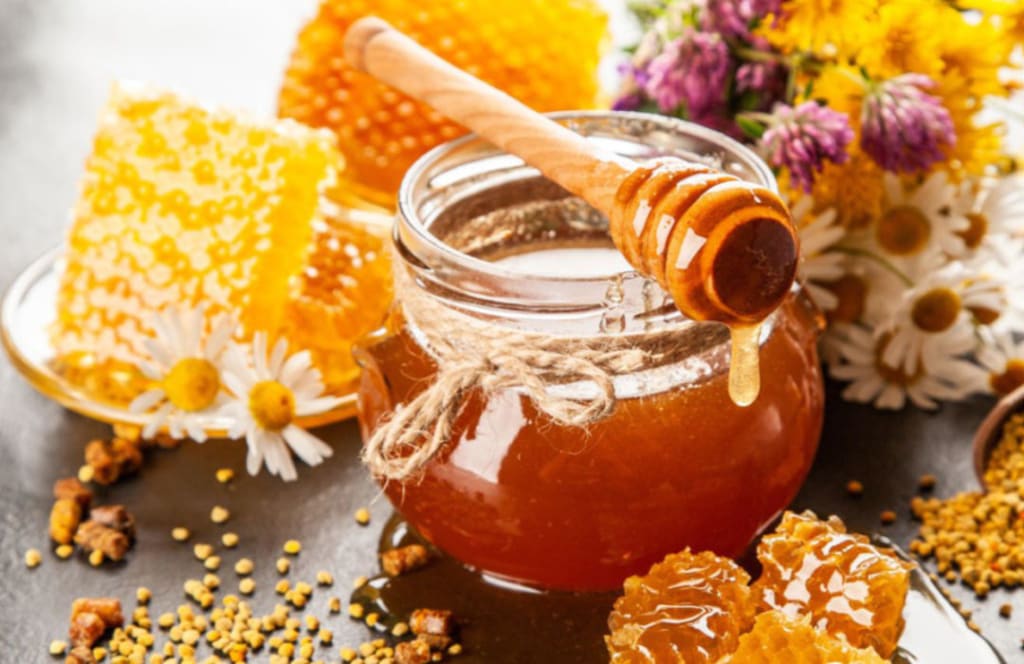Honey Has Surprisingly Sweet Health Benefits...!
This is for you!

Parts and equals Honey is the ultimate all-natural sugar, sticky and sweet, but it's so much more than a sugary substance. The syrupy liquid contains a potent combination of disease-fighting and gut-friendly characteristics, making it a valuable supplement to foods and beverages. Continue reading to discover about the many health advantages of honey, as well as honey recipe ideas.
What Is Honey?
According to the University of Arkansas, honey is a sweet, thick liquid produced by honeybees, which are winged insects that originated in Africa. Honey is made by insects absorbing nectar (a sweet fluid generated by flowers) and partially digesting it in their stomachs. According to the University of Colorado Boulder, they regurgitate the nectar into honeycomb cells (see hexagon-shaped apertures in a beehive), where it is dehydrated by their wings and jaws. Honey is produced as a byproduct, which is used as a food source for bees...and humans!
According to a 2020 scientific review, there are over 300 different types of honey, each of which is determined by elements including the geographical location of the flowers and bees, the time of year the bees collect nectar, and the flower source of said nectar. These characteristics also influence the final taste and color of the honey, which can range from light to dark brown.
Honey Nutrition
According to the aforementioned 2020 study, honey contains 75 to 80 percent carbohydrates (i.e. sugar) and 15 to 20 percent water. It also has modest levels of niacin, potassium, calcium, and magnesium, as well as folate and vitamin C. According to Isa Kujawski, M.P.H., R.D.N., registered dietitian and founder of Mea Nutrition, the antioxidants in honey, notably flavonoids and polyphenols, are the real stars of the show. That's because, as she says, they're responsible for many of honey's health advantages. (Related: Flavonoids' Vital Health Benefits)
According to the United States Department of Agriculture, 1 tablespoon (20 grams) of honey has the following nutritional value:
- 61 calories
- 17 grams carbohydrate
- < 1 gram protein
- 0 grams fat
- < 1 gram fiber
Health Benefits of Honey
To be honest, honey isn't exactly jam-packed with good-for-you macro- and micronutrients when it comes to nutrition. Because it's heavy in sugar, it's also designed to be consumed in tiny amounts. Honey, unlike regular white table sugar, has antioxidants that are known to help the brain and body. According to the University of Arkansas, it's also sweeter than table sugar, so you might be able to use less to satisfy your sweet appetite and, as a result, reduce your sugar intake - if that's your objective, of course. Below are some of honey's potential health benefits.
Staves Off Disease
Reach for honey if you're looking to boost your body's natural defenses. According to Charmaine Jones, M.S., R.D.N., L.D.N., registered dietitian and founder of Food Jonezi, the sweet substance contains flavonoids and polyphenols, both of which are potent antioxidants that "neutralize free radicals and other toxins that could lead to cell and tissue damage," aka oxidative stress. (Free radicals are dangerous, unstable chemicals that are produced by things like pollution and poor nutrition.) According to the Harvard T.H. Chan School of Public Health, oxidative stress can eventually contribute to chronic illnesses including cancer and heart disease. However, antioxidants like those found in honey can help keep free radicals at bay.
According to a 2017 scientific assessment, honey's flavonoids and polyphenols help to reduce inflammation. Chronic inflammation, like oxidative stress, can cause disease by causing long-term cell damage – yet honey antioxidants can reduce the biological mechanisms that cause inflammation, preventing disease even further. Honey also contains vitamin C, a micronutrient with anti-inflammatory and antioxidant properties. According to Oregon State University, it can also boost the formation and activity of white blood cells, which combat foreign bacteria and viruses and defend the body from infection. (By the way, vitamin C is also good for your skin, which is why honey is frequently used in skin-care products.)
Eases Coughing
According to the Cleveland Clinic, both the World Health Organization and the American Academy of Pediatrics recommend honey as a natural cough cure, and with good cause. The golden liquid is thought to serve as a demulcent, a chemical that coats the throat and calms mucus membranes. For example, a 2010 study compared the effects of honey on nighttime coughing in children with upper respiratory tract infections to those of cough medication (dextromethorphan) and antihistamine (diphenhydramine) (e.g. flu, tonsillitis, sinus infection). What were the outcomes? Honey was shown to be the most effective of the three drugs in terms of symptom alleviation. Honey appears to be a particularly effective treatment for cough frequency and severity, according to additional studies.
Promotes Wound Healing
According to the peer-reviewed book Honey Analysis - New Advances and Challenges, using honey to heal wounds, burns, and other topical conditions dates back to ancient Egypt. And, despite the fact that the world has progressed significantly over the last 4,000 years, honey's efficacy as a topical medicine has not waned. According to a 2011 review, the substance's antibacterial characteristics, capacity to retain moisture, and high viscosity are all factors (which helps provide a protective barrier). Honey, in other words, inhibits infection by producing a protective barrier and combating germs, all while keeping the region moist (and preventing dehydration by forming a virtual seal), which has been demonstrated to improve healing.
Do you still need more proof? Several studies have shown that using pharmaceutical-grade honey dressings helps surgical incisions and other wounds recover faster. While most, if not all, forms of honey appear to have antibacterial qualities, manuka honey has been demonstrated to be an especially effective treatment for skin disorders. It's so effective that the Food and Drug Administration approved it as a wound therapy option in 2007.That is to say, if you burn your hand while cooking, you probably shouldn't start smearing whatever honey you have in your cabinet all over your body. However, if you have a particularly terrible burn, a huge wound, or something similar, you should definitely see your doctor, who can advise you on the best course of action. And, who knows, maybe a product like Derma Sciences MEDIHONEY Honeycolloid Paste (Buy It, $26, officedepot.com) may be included.
Supports Brain Health
According to Jones, eating foods high in antioxidants like honey can help prevent neurological illnesses like Alzheimer's and dementia. According to a 2019 study, oxidative stress can cause nerve cells, or neurons, to die. This is a BFD because neurons send electrical impulses to govern cognitive functions (such as memory and learning). These processes can be hampered by neural injury, which can lead to cognitive decline and disorders. Jones also points out that antioxidants in honey can stimulate microglia, which are crucial for protecting neurons and managing inflammation in the brain, according to a 2021 article. Microglia can protect the brain and help prevent neurodegenerative disease when activated by antioxidants like those found in honey.
Supports Gut Health
According to Paula Doebrich, M.P.H., R.D.N., registered dietitian and founder of Happea Nutrition, the carbs in honey serve as fuel for the "good" bacteria in your stomach. This allows the helpful microorganisms to flourish and multiply, effectively inhibiting the activity of destructive insects. Furthermore, those superstar polyphenols and flavonoids have antibacterial characteristics, according to a 2019 research review, which can help keep nasty gut bacteria in check.According to a 2018 article, all of this promotes the activity of beneficial gut bacteria, which are responsible for vital activities like digestion, nutrition absorption, and more. (It's also a good idea to eat these items together to maximize nutrient absorption.)
Potential Risks of Honey
Honey is "usually regarded safe," according to the Mayo Clinic. According to a 2017 case report, a honey allergy is quite uncommon. However, if you have an allergic reaction to honey (swollen lips, hives), it could be due to a variety of ingredients in the liquid, such as proteins from the bee's saliva. (Keep in mind that the bee regurgitates nectar to generate honey.) The more you understand!)
Despite the health benefits of honey and allergies aside, you'll want to limit your intake of the substance in general. After all, "it counts as additional sugar in the diet and should be ingested in moderation" (as should all sugar), as Doebrich points out. A quick rundown: According to the American Heart Association, eating too much sugar can cause blood glucose levels to surge regularly, raising your risk of diabetes, heart disease, high blood pressure, and cognitive issues.All things considered, Kujawski recommends "limiting your daily intake of added sugars to 25 to 35 grams per day, which is around 1 to 2 tablespoons of honey, [assuming] that's your sole source of added sugar [for the day]."According to the Mayo Clinic, if you have diabetes, you should take extra measures because the illness increases your risk of getting hyperglycemia (high blood glucose) after ingesting sugar (honey or otherwise). This is significant because hyperglycemia raises the risk of diabetic complications such as nerve damage and heart disease. The point is, if you have diabetes, talk to your doctor about how much honey, if any, is safe for you to ingest, according to Kujawski.





Comments
There are no comments for this story
Be the first to respond and start the conversation.